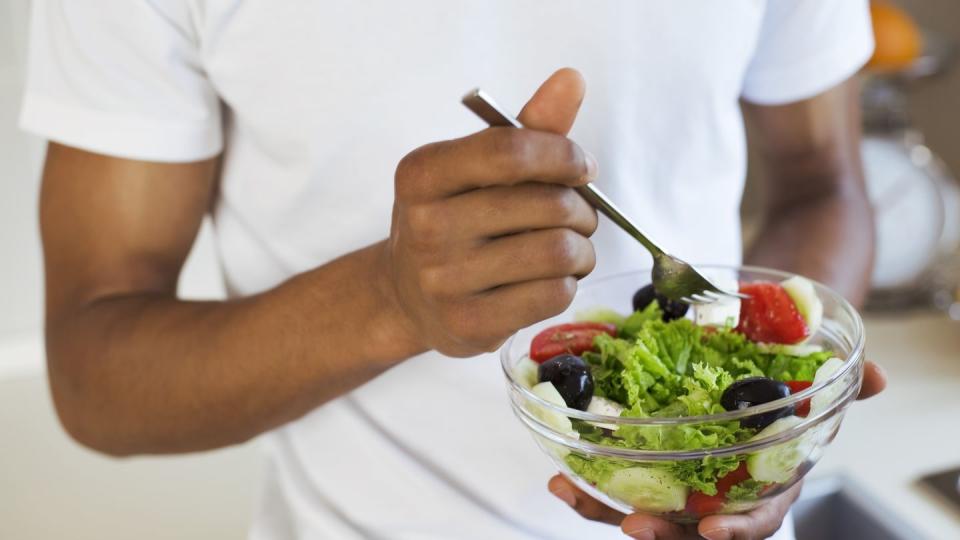10 Ways to Naturally Lower Cholesterol, According to Doctors

"Hearst Magazines and Yahoo may earn commission or revenue on some items through these links."
MANY FACTORS CAN CAUSE your cholesterol levels to creep up, including your diet and how much you exercise. So sometimes making lifestyle changes can lower your numbers.
Cholesterol is a fat-like substance that’s found in all of your cells, and your body needs some of it to work properly. However, too much of certain types of cholesterol can increase your risk for a number of health problems, like a heart attack or stroke.
To know for sure if your cholesterol is high, you need a blood test. Commonly, cholesterol tests measure the amount of low-density lipoprotein (LDL), which is commonly known as "bad cholesterol," and high-density lipoprotein (HDL) cholesterol. Some doctors say that doesn't go far enough to really assess your risk, and they recommend measuring other lipoproteins including apoB and Lp(a). (See Dr. Peter Attia's guidance on this here.)
“People should know that their cholesterol is determined both by their diet and by predetermined genetic factors,” says Brett Victor, M.D., a cardiologist at Cardiology Consultants of Philadelphia. “The degree to which these two factors contribute can vary greatly.”
That’s why some people are able to lower their cholesterol naturally with diet and other changes, and others need to take medication, such as statins, as well, Dr. Victor says.
For many people, lowering their cholesterol requires a combination of lifestyle changes and medication. And doctors often recommend changing what you eat, how often you move, and making other adjustments even if you take cholesterol medications. Here are some ways to help naturally lower your cholesterol:
Embrace a Plant-Based Diet
Tweaking your diet is one of the main ways you can lower disease-causing cholesterol, especially your LDL, explains Ira Monka, D.O., an osteopathic physician specializing in family medicine and president of the American Osteopathic Association.

Reducing your intake of saturated fats, which are found primarily in red meat and full-fat dairy products, can improve your cholesterol numbers. Dr. Victor suggests generally eating more plant-based foods, like fruits, vegetables, and whole grains.
Choose Lean Meats
If you aren’t ready to fully go plant-based, eat lean meats, like fish and chicken, instead of red meat, Dr. Victor says.
Cut Out Processed Foods
Ultra-processed foods, such as fast food, packaged meals, cookies, and soft drinks, have been linked to higher risks for heart disease. Studies also suggest that eating too many of these foods can worsen your overall nutrient intake and negatively affect your cholesterol levels.
Eat More Fiber
Foods rich in soluble fiber—such as whole grain cereals, fruits, vegetables, beans, and lentils—can help the digestive tract get rid of cholesterol, Dr. Victor says. Soluble fiber binds to cholesterol in your intestine and removes it from the body, reducing the likelihood of cholesterol being absorbed into your bloodstream.
Get More Exercise
“Cardiovascular exercises that get your heart pumping,” like running, walking, biking, and swimming, can help lower cholesterol, Dr. Monka says. These exercises can raise your HDL, which absorbs LDL cholesterol in your blood and carries it back to the liver, where it’s flushed out of the body.

Strive to get moderate physical activity at least 30 minutes a day five times per week and vigorous aerobic activity for 20 minutes three times a week, Dr. Victor says.
Reduce Your Stress Levels
Stress can heighten your risk for many health problems, Dr. Monka says. Research shows that stress can raise your LDL cholesterol and triglycerides.
“There are people who eat healthy, and they wonder why their cholesterol levels are high. This could be one of the reasons,” he says. Taking steps to reduce stress however you can is good for your cholesterol levels.
Quit Smoking
Smoking cigarettes can cause your blood pressure and heart rate to jump. Within 20 minutes of quitting, you’ll see those rates recover, according to the Mayo Clinic. After a year of not smoking, your risk of heart disease will be half of what a smoker’s is, and you’ll see improvements in your cholesterol.
Drink Less
If you do drink alcohol, do it in moderation. That means up to two drinks a day for men under 65 and one for those older than 65, according to the Mayo Clinic. Binge drinking or just generally drinking too much alcohol can affect your cholesterol, as well as bring on other health issues.
Maintain a Healthy Weight
Extra body weight can increase your risk for high cholesterol. So when you keep your weight in a healthy range, it can help reduce your cholesterol levels and lower your risk for health conditions. Reducing your intake of sugary, high-fat, and high-calorie foods and increasing your activity level can help.
Try Red Yeast Rice Supplements
Many natural products out there claim to lower cholesterol. Dr. Victor said the only one that has been clinically shown to help is red yeast rice, which is available in supplement form.
Red yeast rice contains the compound monacolin K, which is an ingredient found in some cholesterol-lowering medications, according to the Mayo Clinic. While the supplements are considered safe, they could cause some side effects. Dr. Victor suggests talking to your doctor before taking them.
When to Take Medication for High Cholesterol
Most doctors recommend that you change your diet, exercise more, and stop smoking when you have high cholesterol—regardless of whether they also prescribe medications, Dr. Monka says.
Often, you will need to take at least a low-dose statin to see your cholesterol levels lower, he adds.
Sometimes, if you need to start out taking a higher dose of cholesterol-lowering drugs, you can end up taking a lower dose or potentially stop taking the medication after making and maintaining significant lifestyle changes, Dr. Victor says.
You Might Also Like

